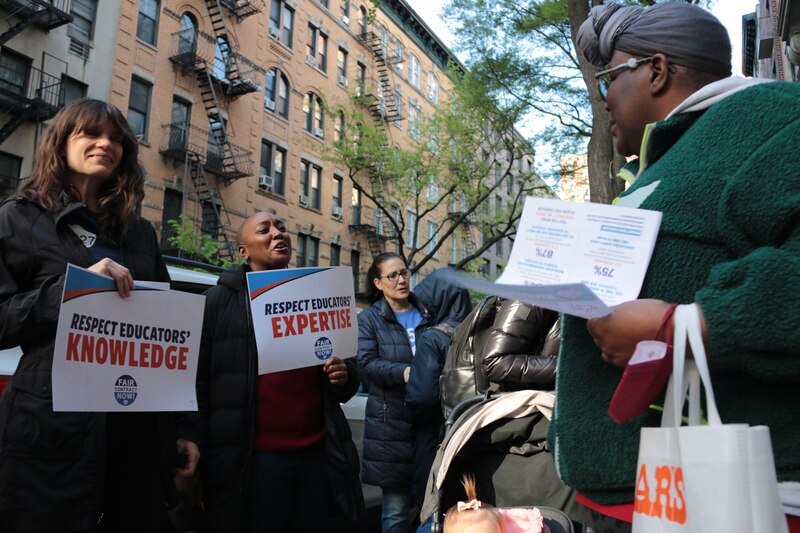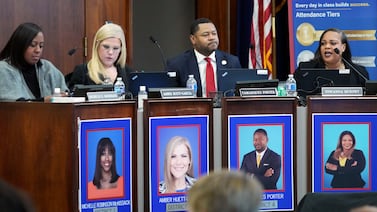Chalkbeat is a nonprofit news organization covering public education in communities across America. Sign up for Chalkbeat New York’s free daily newsletter to keep up with NYC’s public schools.
As New York City’s teachers union pushes for a contract, some educators took to the sidewalks during arrival on Monday to call attention to administrative tasks that distract from teaching.
“We were hired to nurture and educate children, not to feed a bureaucratic beast that can no longer ever be satisfied,” United Federation of Teachers President Michael Mulgrew said Monday morning, flanked by educators at P.S. 527 and M.S. 114 on the Upper East Side. “And that is why the teachers are here today.”
But one major issue received comparatively less attention during the event with the union chief: pay increases.
Educators across the city said they’re concerned that an upcoming deal won’t keep up with rising costs, even as teachers faced enormous responsibilities during the pandemic to quickly spin up remote schooling and are now working to catch students up from years of interrupted learning.
“We were called pandemic heroes, we were called essential,” said Martina Meijer, a Brooklyn elementary school teacher. “Love and thank-you cards cannot pay our bills. Our wages are not keeping up with inflation.”
Educators have good reason to worry that a contract will likely not match inflation, which has moderated somewhat in recent months but reached 6.5% last year. New York City unions historically participate in pattern bargaining, which means that once one union reaches a deal on wages, subsequent unions typically follow the same rough outline.
So far, none of the unions that have recently reached deals with the city have matched or exceeded the rate of inflation, which means workers effectively experience pay cuts. District Council 37 — which covers cafeteria workers, crossing guards, and childcare workers — accepted a $3,000 signing bonus and annual wage increases of 3% with a 3.25% increase in the final year of the contract (the agreement is retroactive to 2021). The Police Benevolent Association scored somewhat higher wage increases, topping out at 4%.
“The moment the DC37 contract came out, they set the pattern for wage increases. And those numbers are pretty dismal,” said Ilona Nanay, a literacy coach who is part of the UFT’s 500-member bargaining committee and a member of its executive board. “UFT members are now extremely worried that’s the pattern that’s been set.”
Mulgrew indicated that significant pay bumps would be difficult to achieve given the increases that have been established by other unions. “We have tried to break pattern bargaining in the past — we have not been successful,” he said Monday. “That’s as far as I want to go on that subject right now.”
Mayor Eric Adams has argued the city can’t afford to take on significant cost increases, pointing to uncertain economic headwinds and dwindling federal pandemic relief funding. A City Hall spokesperson declined to comment on the status of negotiations, or any of the city’s proposals, except to say officials hope to reach an agreement soon.
The UFT represents about 120,000 school staff, including 77,000 teachers who currently earn just over $61,000 at the bottom of the pay scale to nearly $129,000 at the top. The union also includes 25,000 paraprofessionals who typically work as classroom aides for students with disabilities and earn considerably less, with salaries that start just under $28,000 and top out shy of $45,000. The UFT’s current contract expired in September.
Many educators already struggle to afford to live in the communities where they teach, and some said they worry that anemic raises will make it even harder to attract and retain them. Mirroring patterns across the country, teacher turnover in New York City increased this past year to 8%, up from about 6% before the pandemic.
“The first few years are really difficult — it takes a while to become a really good teacher,” Olivia Swisher, a middle school art teacher at Sunset Park Prep who is part of the union’s bargaining committee and has been teaching for about five years. “If we don’t create a way for me to pay my bills, pay my rent, then I won’t be able to continue being a teacher and I desperately want to.”
Still, it’s unclear to what extent raises that don’t keep pace with inflation might influence the local labor market for teachers. Although the cost of living in the city is high, “salaries are already relatively high,” said Melissa Arnold Lyon, an assistant professor at the University at Albany who studies education-related political and policy issues. “They probably have more wiggle room than other places.”
Pocketbook vs. paperwork
The UFT’s focus on workplace rather than pocketbook issues may reflect that the union is boxed in on wages. Last month, for instance, union officials organized a “grade in” where teachers took to coffeeshops and other public areas to demonstrate how much time they devote to non-teaching responsibilities.
On Monday, teachers gathered outside their school buildings across the city to distribute flyers that detail survey results that suggest many teachers believe administrative tasks are interfering with student learning. The union is planning similar actions all week.

Multiple educators said they agree that administrative tasks can take time away from teaching and learning and hoped the union could make some headway on those issues in a new contract. Some pointed to clunky attendance and special education data systems that are time-consuming to use, eating into time that could be used planning lessons.
Others pointed to assessments educators were required to fill out regarding their students’ social-emotional health, which certain schools have found useful but some educators said was a waste of time. (The city has since made them optional.)
“There are all of these diagnostics that superintendents put on principals that we have to do — we lose instructional time to those assessments,” said Swisher. “It’s burdensome, and we don’t do much with the data anyways.”
Union officials have been tight-lipped on exactly how they want to change the contract to reduce the time teachers spend on paperwork or other administrative tasks. “I’m not allowed to specifically talk about any of the demands,” Mulgrew told reporters. Members of the union’s 500-member negotiating team have also been required to sign non-disclosure agreements, multiple participants told Chalkbeat.
Secrecy around contract demands frustrate some members
The union’s reluctance to lay out its proposals publicly has frustrated some UFT members who believe that sharing specific demands would help galvanize support for a stronger contract from the public and make it easier to organize their colleagues.
Keeping the demands a secret “makes it really hard to mobilize folks because people want to know what they’re being mobilized for,” said Nanay, the bargaining committee member who is also part of the Movement of Rank and File Educators, or MORE, a progressive caucus within the union that is often critical of Mulgrew’s leadership.
Several teachers pointed to Los Angeles as a model of an activist approach, arguing that the union has been more public with its demands and was willing to walk off the job to pressure district officials. Union and district officials there recently reached an agreement to raise teachers’ wages by about 21% over three years.
Mulgrew defended the union’s strategy, arguing the UFT does not want to tip its hand. “If you tell the other side exactly everything that you want, it’s probably a good bet that they’re gonna use that against you in negotiations.”
Lyon, the University at Albany professor, also emphasized that the UFT can’t easily threaten or carry out a work stoppage because a teachers strike would violate New York’s Taylor Law, which imposes significant financial penalties for public sector unions that strike.
Still, frustration with the union’s leadership over wages could create political headaches for union leaders. When the last contract was approved in 2018, teachers raised similar concerns even though inflation was considerably lower.
The union’s leadership is facing other headwinds, too, including a controversial effort to move retirees to a privatized but federally funded Medicare Advantage plan. Mulgrew was re-elected last year by the smallest margin since he won his first full term in 2010, though his victory was still decisive.
“He’s maintained power pretty successfully, and has been able to continue his same leadership style, even in the face of resistance,” Lyon said. “But it will hinge on his ability to win the benefits that the majority of teachers want.”
Alex Zimmerman is a reporter for Chalkbeat New York, covering NYC public schools. Contact Alex at azimmerman@chalkbeat.org.






